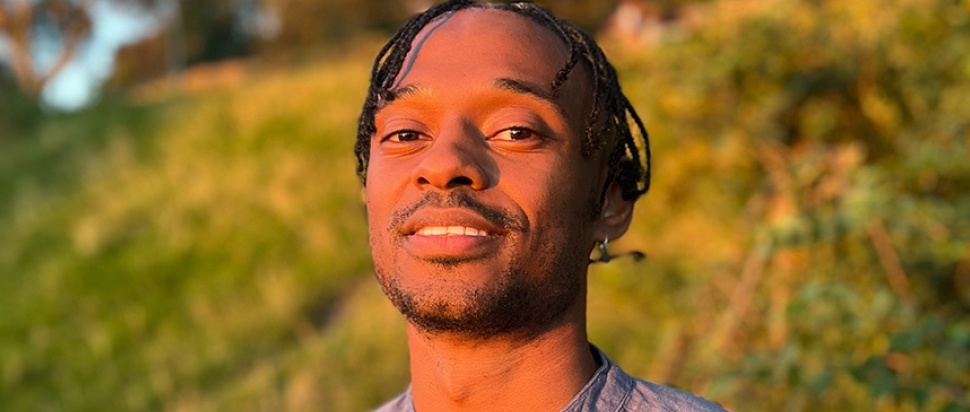Selali Fiamanya on his debut novel Before We Hit the Ground
We chat with Glasgow-based debut author Selali Fiamanya, whose debut novel Before We Hit the Ground is a tender and wrenching account of immigrant family dynamics
“The goal with this type of literature is that spark of recognition,” Selali Fiamanya says. He’s speaking about his debut novel Before We Hit the Ground: a literary burst of fireworks depicting a Ghanaian-Scottish family, whose heartwarming yet tense family dynamics mirror something that is scarily close to home for so many first-generation Ghanaian immigrants. In this family, the parents, Abena and Kodzo, migrate from Ghana to Scotland in the late 80s. Their children Elom and Dzifa are born and raised in Glasgow, with Abena becoming a pastry chef and Kodzo a nurse to keep the family afloat. As the lives of this family are unravelled by grief, sacrifice and sexual repression, the precarity of home becomes the book’s central question, speaking in a language that so many Ghanaian immigrants – including both first and second-generation, and beyond – can understand.
This idea of home is a difficult topic across both immigrant and queer communities. In Before We Hit the Ground, each character can claim more than one place that serves as a profound site of belonging and relating to the world. Venturing across Glasgow, Accra and London, these cities are nevertheless never big enough to permit every single member of the family escape from both external and self-expectations.
For Fiamanya, this diasporic vision of home that the characters navigate found expression in the “urban/rural question,” he explains. “I love the countryside but I feel that it's more difficult to access because of this sense that in order to allow yourself to enjoy that land, you [usually] have to have a blood tie to that land. I am interested in interrogating how immigrants can lay claim to or access rural spaces, because the earth should belong to us all.” We see this in the character of Elom, the son whose death in the first chapter totalises the search for home, who is most at peace when he wild swims in quiet towns across Scotland where he will not be recognised. With his younger self haunted by a lack of freedom, and his older self frozen in uncertainty, he turns to the land – foreign as it is – for a sense of belonging. In different ways, all the various members of this family are forced to face and fend for themselves, as the sacrificial acts of love that have long bonded them come to unearth buried resentments.
Love, as Fiamanya puts it, is impossible without this kind of sacrifice. “I think love can be liberating and self-actualising but if you aren't sacrificing as part of it then I don't know if that is love," he explains. “Maybe that's a cynical view from me but if you love someone, you're going to have to give a bit of yourself up to do that. That's the reality of what love is, [but] it can be taken to extremes.” Before We Hit the Ground touches on the strain between parents and children who cannot see eye to eye, including on sexuality. Fiamanya hopes that readers might use this conversation to also offer grace to our parents. “I think it's important to acknowledge [that our parents are trying]. It's not a one-way thing – parents want their kids to be proud of them.”
Throughout the book, fundamental relationships – including ones to God – are daringly undone and remade. Long a devout Christian, Kodzo breaks away from his faith in pursuit of general spirituality. Meanwhile Abena, whose convictions pale to Kodzo’s, stands firm in her quiet rejection of the faith that has never seemed to be in her corner. “I wanted to see how you can grant someone more freedom and curiosity within this religious confine,” Fiamanya says. Kodzo’s Christian values, though certainly well-intentioned, contain a patriarchal contract that blows through the whole family: it silences his wife Abena’s aspirations and leaves a cold gap in his relationship with his children. “I was interested in this character who relies on religion, and his religion has been good for him in lots of ways,” Fiamanya says. “I would class him as a good Christian man. But that type of religion is so rigid and so constricting. I was interested in exploring how that can be oppressive and I wanted to come into that margin, that line between freedom and control.”
It is this change that brings Abena and Kodzo closer together once their children move out. Yet some notions of change seem out of limits for both of them. Despite both having spent a similar amount of time in Ghana, they cannot agree on where to call home after retirement and now that Elom is gone. Abena seeks to return to Ghana permanently, while Kodzo never wants to return. “That memory of home lives within them,” Fiamanya says. “What happens when you're confronted with the reality of what it is now?” It is a question, Before We Hit the Ground understands, without resolution; rather, it is in the questioning that such lives are experienced.
Before We Hit the Ground is out now with The Borough Press
Selali Fiamanya will be at Lighthouse Bookshop, Edinburgh on 11 Sep as part of Queer Debut Showcase
